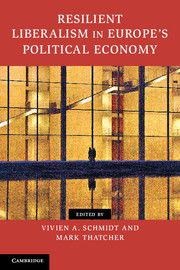Book contents
- Frontmatter
- Contents
- List of figures
- List of tables
- List of contributors
- Preface
- 1 Theorizing ideational continuity: The resilience of neo-liberal ideas in Europe
- Part I Economy, state, and society
- Part II Neo-liberalism in major policy domains
- Part III Neo-liberalism in comparative perspective
- Part IV Conclusion
- Index
Preface
Published online by Cambridge University Press: 05 June 2014
- Frontmatter
- Contents
- List of figures
- List of tables
- List of contributors
- Preface
- 1 Theorizing ideational continuity: The resilience of neo-liberal ideas in Europe
- Part I Economy, state, and society
- Part II Neo-liberalism in major policy domains
- Part III Neo-liberalism in comparative perspective
- Part IV Conclusion
- Index
Summary
Although, when viewed from afar, Europe may appear to be a haven of Social Democracy, strongly opposed to economic liberalism, closer analysis reveals that the place of ‘neo-liberal’ economic ideas in policy debates has grown steadily since the 1980s. Such ideas which, most simply stated, centre on extending market competition while limiting the state, have had a profound influence on the institutions, policies, and practices of capitalism across different European countries as well as in the European Union (EU). Neo-liberal ideas have continued to dominate policy debates through Europe's economic and political booms and busts.
This resilience of neo-liberal ideas is surprising. Europe offered a relatively ‘cold climate’ for economic liberalism in the 1970s, with well-entrenched alternative ideas based on Social and Christian Democracy – to say nothing of strong Marxist traditions. Powerful theoretical critiques have been made of neo-liberal ideas while policies inspired by neo-liberalism – such as allowing greater competition in financial markets, reducing regulation, and cutting back state spending and deficits even in economic downturns – have met with failure. The present difficulties of neo-liberalism can be contrasted with the past successes of alternative models, notably social democratic models. However, the greatest surprise came in the 2000s, first with the absence of any major re-evaluation of neo-liberal ideas about governing the markets in the face of the ‘dot-com’ boom and bust and then, even more significantly, with the economic crisis beginning in 2008. After a brief neo-Keynesian moment at the very inception of the crisis, far from abandoning neo-liberal ideas, European policy makers responded with calls for their extension. They accepted or even embraced ideas of reducing public expenditure, delegating greater powers to supranational bodies, increasing liberalization, and imposing ‘market discipline’ through austerity.
- Type
- Chapter
- Information
- Resilient Liberalism in Europe's Political Economy , pp. xv - xxiiPublisher: Cambridge University PressPrint publication year: 2013



